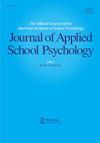培训职前通识教育教师对干预的反应:对美国教师教育工作者的调查
IF 1.5
Q4 PSYCHOLOGY, EDUCATIONAL
引用次数: 6
摘要
响应干预(RTI)是一种基于证据的教育服务提供方法,正越来越多地被全国各地的学校采用。为了有效地实施RTI模式,教师需要专门的培训。但是,目前很少知道在职前一级提供这种培训的程度。摘要本研究的目的是了解本科基础教育专业职前通识教育工作者的rti相关训练。受访者包括95名美国认可学院/大学教师教育项目的项目主任。参与者报告说,提供了与RTI的六个核心组成部分(即多层服务提供、普遍筛查、进度监测、基于数据的决策、循证干预和实施保真度)相关的不同水平的教学和应用培训。虽然大多数教师教育工作者熟悉RTI的整体概念,但超过三分之一的受访者不熟悉实施保真度的核心组成部分,并报告在这方面提供有限的培训机会。受访者还指出,他们项目中的职前教师是否接受了与具体进度监测工具和循证干预措施相关的培训。对经常与教师合作实施RTI模型的学校心理学家的影响进行了讨论。本文章由计算机程序翻译,如有差异,请以英文原文为准。
Training preservice general education teachers in response to intervention: A survey of teacher educators throughout the United States
Abstract Response to intervention (RTI) is an evidence-based approach to educational service delivery that is being increasingly adopted by schools across the country. To effectively implement RTI models, teachers require specialized training. Little is currently known, however, about the extent to which this training is being provided at the preservice level. The purpose of this survey study was to learn more about RTI-related training provided to preservice general educators in undergraduate elementary education programs. Respondents included 95 program directors of accredited college/university teacher education programs across the United States. Participants reported providing varying levels of didactic and applied training related to each of the six core components of RTI (i.e., multitiered service delivery, universal screening, progress monitoring, data-based decision making, evidence-based interventions, and fidelity of implementation). Although most teacher educators were familiar with the overall concept of RTI, over a third of respondents were not familiar with the core component of fidelity of implementation, and reported providing limited training opportunities in this area. Respondents also indicated whether preservice teachers in their programs receive training related to specific progress monitoring tools and evidence-based interventions. Implications for school psychologists, who frequently collaborate with teachers to implement RTI models, are discussed.
求助全文
通过发布文献求助,成功后即可免费获取论文全文。
去求助
来源期刊

Journal of Applied School Psychology
PSYCHOLOGY, EDUCATIONAL-
CiteScore
2.40
自引率
10.00%
发文量
7
期刊介绍:
With a new publisher (Taylor & Francis) and a new editor (David L. Wodrich), the Journal of Applied School Psychology will continue to publish articles and periodic thematic issues in 2009. Each submission should rest on either solid theoretical or empirical support and provide information that can be used in applied school settings, related educational systems, or community locations in which practitioners work. Manuscripts appropriate for publication in the journal will reflect psychological applications that pertain to individual students, groups of students, teachers, parents, and administrators. The journal also seeks, over time, novel and creative ways in which to disseminate information about practically sound and empirically supported school psychology practice.
 求助内容:
求助内容: 应助结果提醒方式:
应助结果提醒方式:


